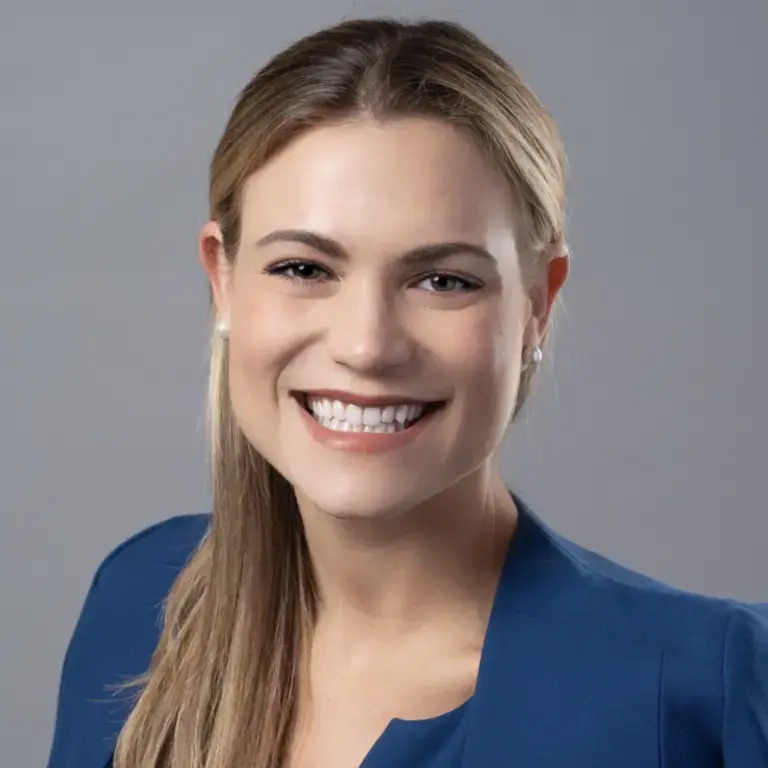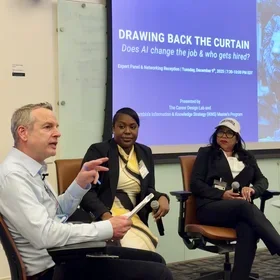Laura Dannels is Chief Talent Officer for one of the Southeast’s largest healthcare systems, Wellstar Health System. She’s also a Lecturer in the Human Capital Management program. Recently recognized in Atlanta Business Journal's 40 under 40, Laura shares why she decided to pursue a career in human capital management and offers advice to aspiring HCM professionals in the following Q&A.
What drew you to a career in human capital management?
As a lifelong learner, I am deeply passionate about supporting individuals in unlocking their full potential. In turn, I have witnessed how driven and empowered people power organizations. Organizations that can harness the power of their people are the ones at the forefront of their industries, who remain agile through challenges, who constantly reinvent themselves, and who can innovate to maintain their competitiveness.
I have a fundamental belief that doing what’s right for employees will benefit organizations. This principle has been popularized by Jacob Morgan in The Employee Experience Advantage and approaches developed through research, including my own during my doctoral studies. Today, I help organizations lead and encourage holistic activities to enhance the employee experience.
Finally, I care deeply about making workplaces more human, given that we spend a full third of our lives working (90,000+ hours over the course of a lifetime). Doing this means fundamentally redesigning how we work. This is made even more challenging given the way our personal and professional lives are now deeply interconnected. I help organizations view employees as whole individuals and actively support employees in improving the multiple aspects of their lives.
Importantly, all my work is co-created with business leaders and those closest to the problems, as they often have the powerful insights to establish effective solutions. Throughout it all, I strive to think innovatively and help others imagine greater possibilities to solve the problems at hand.
What aspect of your journey has allowed you to succeed in this industry?
I credit my success in HCM to my strong business acumen and understanding of human psychology. Obtaining an MBA, as well as a Ph.D. in the field of psychology, have been critical in cultivating this acumen. I also have a sincere desire and fervent drive to uncover the roots of problems facing organizations to implement timely, effective, and lasting solutions. I do this through alignment of the business and HCM strategies, extensive data collection and analysis, and change leadership. Importantly, all my work is co-created with business leaders and those closest to the problems, as they often have the powerful insights to establish effective solutions. Throughout it all, I strive to think innovatively and help others imagine greater possibilities to solve the problems at hand.
What industry trends should students entering this field be aware of?
Students entering this field should be aware that the expectations for HR have changed: today, we are no longer confined to transactional employment exchanges and interpreting employment rules. Today, we are expected to deliver measurable business results through strategic human capital management. This means you must understand how to navigate the current business environment affected by challenges such as VUCA, the Great Resignation, War for Talent, and runaway employee burnout. Moreover, as you navigate these challenges, you need to contemplate how the solutions you choose will affect the future of work in your organization. To rise to these challenges, you must make sure you and your people have the knowledge, skills, and abilities to fulfill your organization’s mission, vision, and strategic objectives. This generally means doing a lot of reskilling, upskilling, and flexible development as well as creating the leader pipelines to assure business continuity now and into the future.
My advice to an incoming HCM student is that you need to understand the shifting business landscape and expectations of working in HCM today. You will need to be highly analytical, data-driven, and digitally savvy to thrive in this area in the future. If you lack these skills, you’ll have a chance to develop them in the program but I’d also encourage you to start now through mentoring and your own informal learning.
What advice would you offer to an incoming Human Capital Management student?
My advice to an incoming HCM student is that you need to understand the shifting business landscape and expectations of working in HCM today. You will need to be highly analytical, data-driven, and digitally savvy to thrive in this area in the future. If you lack these skills, you’ll have a chance to develop them in the program but I’d also encourage you to start now through mentoring and your own informal learning.
What do you enjoy most about your role as Chief Talent Officer at Wellstar Health System?
I most enjoy partnering with business leaders to change and transform the business through our greatest asset, our people. With a shortage of healthcare workers on the horizon, ensuring our workforce has the skills and capabilities to execute on our strategic themes is critical to ensure we can deliver on our mission to enhance the health and well-being of everyone we serve. It’s a win-win to develop individuals who are in turn, developing the future of the organization for our consumers and the communities we serve.
Is there one misconception about working in the human resources/HCM field you'd like to dispel?
A lot of books and articles bemoan that HR needs a seat at the table and needs to be a partner. In the time of The Great Resignation and COVID-19 catapulting forward the Future of Work, this is an unfortunate and wasteful misperception. HR already has a seat at the table! We already are vital partners to the business! Now, it’s time to perform.



